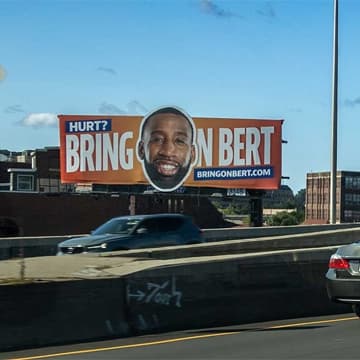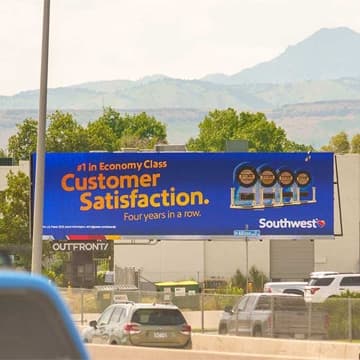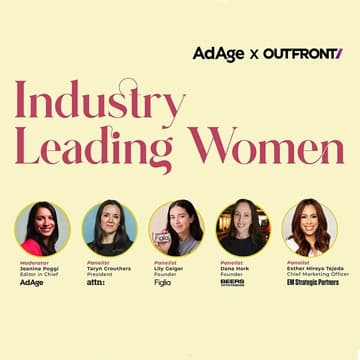
Black in New York: Panel Highlights from OUTFRONT HQ
June 13, 2025
OUTFRONT hosted Black@ for The Bigger Picture: Black in New York, a daylong series of panels spotlighting Black voices and allies in the creative industries, women in brand marketing, and the landscape of DEI in America. It was a profound day of insights, perspectives, and provocative conversations on topical subjects. Here are some of the highlights from the six panels.
Not a DEI Hire:
Adrienne L. Lucas, Global Head of Strategic Partnerships and DEI, OneClub of Creativity moderated the first panel, Not a DEI Hire. The panel included Steve Jones, CEO and Founder, POCStock, Adrianne C. Smith, Founder, Inkwell Beach, and Aba Blankson, CMO, NAACP.
Smith: I think the issue becomes how people define what a DEI hire actually is. If you are a leader and you provide access, opportunity, and growth for your organization, you should be proud to say that you are a DEI hire. And what that means is you believe fundamentally in creating a space or organization that is responsible for creating inclusive environments. You're finding the best talent for your organization…there are stats that say the more diverse and inclusive your organization is, the better opportunity you have to create revenue growth. The more diverse the talent is, the better ideas that come up for growth and opportunity.
Jones: I work with a lot of creative teams, monolithic teams, and anytime you introduce new ideas, that team gets better and stronger. The core of the diversity inclusion, making people feel like they belong – as a business owner, as an entrepreneur, you know when you get those first employees and they're attached to your brand, and you make them feel like they belong and you give them a space to be leaders and contribute. They work harder for you. They show up more.
Blankson: Saying “diversity, equity and inclusion” out loud is very important because I think when we say the acronym DEI, it's easier for people to disassociate what it really means. We need to reclaim this because they're turning it into something that it's not… Every time African Americans push forward, there's this sort of counter and then we push forward again. And we when we push forward again, the result is even better. And then the counter comes back. And so that's how we've been moving. And this isn't a moment to sort of shrink and be silent in a way. This is a moment for us to come together and so that we can continue to push forward even more.
The State of Creativity, Culture, & Brands
OUTFRONT Creative Director, Eastern Region, Tim Wasicki moderated The State of Creativity, Culture, & Brands, joined by panelists Oury Tamboura, VP, Global Brands and Advertising, Citi Bank, Alex Frais, SVP, Steve Madden, Malcolm Ellis, Head of Diverse Investments, Diageo, and Kerel Cooper, SVP Strategy, Burson.
Tamboura: I think a lot of brands have been comfortable with just getting us to sit at the table.. It's about not only being in the room, it's being involved in the strategy, it’s rearranging the room. It means Black creators, and not only from a creative standpoint, not just being on the set, but being behind the camera, being involved with the strategy. … that's how I see rearranging the room, but it's also giving them creative power, creative freedom and having them benefit from the financial reward from the work. One brand that's doing it really well is Netflix. They're not only having people in front of the camera, they're having people behind the camera. They're collaborating with studios like Tyler Perry. They just had a collaboration with Shonda Rhimes …they're giving them the creative freedom to do what they want and they're sharing the financial reward of those collaborations.
Ellis: [Cultural engagement with Black audiences] shouldn't be one time a year. It's like, oh, it's that holiday. It's Valentine's Day. “Oh, I love you, hon.” Now it's like, every day, in theory, I should love you, right? So, it's a similar approach…the brands that do that well, it's just part of the day-to-day programming.
Frais: If I'm looking at like Black History Month, [the brand should approach it as], “how do we incorporate this as part of our business?” It’s not “ugh, we're going to tell a story.” It's actually part of our business is day-to-day? We're partnering with somebody, we're telling a story, we're helping them. This doesn't feel foreign in how we're talking to our consumers. So then it just becomes part of like the BAU – I call it BAU business as usual. It’s authentic.
Trust in the Age of Misinformation
The next panel saw BET+ EVP & Head Streaming Jason Harvey, American Urban Radio Networks CEO AURN Chesley Maddox-Dorsey, and Dr. Malik Yoba, Founder & CEO, Yoba Global Solutions discuss Trust in the Age of Misinformation in a panel moderated by Jeff Osuji, CEO and Co-Founder, Eventnoire.
Harvey: For us at BET+, it all starts with purpose. And being true to that purpose – BET as a media group has been around for 45 years and we've always been known for and our core values around empowering our community, amplifying black storytelling, and really being a driving force for truth and media. And so we stand on that and then we consistently prove that through everything that we do right through our marketing efforts, through the content that we create, through the partners that we partner with from a brand standpoint, as well as through our internal policies, like our policies stand on those same values. And so for me, credibility is understanding your values and then being consistent in conveying them and then walking that walk.
Chesley: Brands shouldn't be on Twitter…the reality is that when you have a platform that's owned by someone who knowingly sends out false information and then sues and threatens brands to support him, that should be a wake-up call, right? Because you’re really co-signing on misinformation. If you're a brand and you're associated with that, then you're going to be associated with false information and knowingly false information.
Yoba: If you move in purpose, on purpose, particularly when you're here to serve people and you're here to elevate, not the singing and dancing entertainment, that's easy, right? I think that you have to make a choice, to decide why you’re here on this planet, Why are you breathing air? Why are you taking up space? What is your real purpose? Is it just to make money? Is it just to have a name or is it to really be of service to something bigger than yourself. And I think that particularly and historically, every person that looks like us, especially that has been here to serve something bigger than ourselves, has always been met with misinformation.
_____ Week?:
Rebranding Blackweek as ____ Week? called attention to the rollback of DEI policies in this discussion between Andre Grey, CCO, Havas Lynx, and Adan Romero, EVP, Razorship, the founders of Blackweek, alongside moderator Lindsay Rittenhouse, Senior Reporter at Ad Age.
Romero: The reality is, our culture, our stories – those are time capsules. And if we start being quiet, if we start taking a back seat, then history is going to be misrepresented. We're not going to be showing up. We're not going to be seen. And although you're feeling it in the moment, the reality is that if we keep being quiet, if we keep allowing a ratio to happen, we're going to actually erase who we are as people.. This is the time that we have to be louder and we have to push against it.
Grey: Because when you look at the facts – and that's the core of Black week - it's about the fact that Black, brown, or historically underrepresented, move culture, which moves business, right? There is no Elvis Presley without black culture. There is no Swedish House Mafia without house music, without rent parties.
From Campaigns to Movements: The Evolution of Creative Activism in Branding
How can brands authentically engage with social movements and cultural moments? That was the topic of From Campaigns for Movements, The Evolution of Creative Activism in Branding, a panel moderated by OTB Digital’s CRO Nadege DeBrosse featuring OTB CEO Chad Fernandez, and Chief Revenue Officer Jarret Thomas alongside Dr. Babs Faseesin, SVP, Strategy at Starcom.
Fernandez: I like to put it simply, like, are we doing something or we not doing something? That's what activism is like, because sometimes I feel like we overcomplicate things so much that we spend too much time talking and not enough time doing. We spend too much time talking. Like, the conversations are great. Us having this panel, this is phenomenal. What happens after the panel? What happens after the panel ends? Then all the talk stops and then where's the movement behind the message?
Faseesin: Often times brands attempt to hijack moments in culture and those we've seen that play out across multiple categories and across multiple brands. But audiences, consumers are savvy. They know exactly when brands are inauthentic and as a strategist, every day I work and make recommendations to brands urging them to show up more authentically in spaces that they have a right to play. Because oftentimes brands just want to leverage opportunities, like, “there's an opportunity in a specific time and culture. Let's jump on that opportunity.” My question oftentimes when these come to me is, what's your right to play in that space? You sometimes have the money, yes, you have the budget, you have the brand equity, you are known and all of that. But do you have a right to play in that specific time and culture? If you don't, please don't step in there because whilst you're thinking that you could secure some of the dollars from that opportunity, you certainly should know that you're dealing with an audience today that's more savvy than ever before. They would see through it and understand that you're showing up just to take advantage of the cultural moment, as opposed to showing up authentically in a space that you truly own the right to play.
Thomas: Companies’ bottom line is not our story or struggle. No, their bottom line is their dollar. I think the better question is should we allow brands in on some of these movements? Would Colin Kaepernick's movement been better had it not had Nike? We need those dollars to get our message and voice out. We can't hold them accountable when I need your dollars. So then it's a slippery slope that you play as a content creator, as a consumer… When we have these movements like the Black Lives Matter movement, imagine you see Nike swoosh on a Black Lives Matter. They were there. If you looked at every NBA game, it was on the court, all those things, right? Did it dilute the message of what we were trying to accomplish? Should we include the brands of these moments?
Driving Creativity and Innovation in the Age of AI
The day’s final panel was on the subject of Driving Creativity and Innovation in the Age of AI. Sitting on this panel were Sherina Florence, Founder & Conscious Futurist, IABM, Sthu Zungu-Noël, Private Sector Partnerships Development, UN Women, Crissy Spivey, SVP Strategy, Burson, and Valerie Vespa, VP Brand Partnerships at OUTFRONT. Shauna Seresin, co-founder of Minerva, moderated the session.
Florence: I do think [maintaining ethical standards in AI] is absolutely everyone's responsibility. There will not be time for regulations, there won't be time for upskilling that's going to catch you up to where everything is because of the speed of technology. We'll be in a very non-linear environment that feels extremely fast. So to me, everyone maturing a little bit, elevating that creative consciousness and starting to approach what we do as adults rather than children and to become caretakers of the world and to really hold yourself to some ethical standards. Because I do not believe that we will be able to regulate, monitor and do all of the things that are best for everyone in time. It's almost like we have to work on the way that we perceive and understand the world and the type of integrity and value we want to deliver.
Spivey: I think brands really have to stand up. They really have to connect with people in real ways. I think we're seeing less and less of that. Brands need to try to find ways to connect with people in authentic ways. Like really go out, have conversations, have dialogue, be in communities, separate themselves from the screens, separate themselves from the tablet, separate themselves from all of this stuff. And they also have to own up to missteps because there's so many times that they are doing missteps and they're really just glossing over it. I think people are actually kind of forgiving if people, if brands will own up to things. But until then, we'll move on to someone else.
Zungu-Noël: Even as we are talking about this powerful technology which is here and really transforming everything, there's a whole group of women who are still not in the room. But UN Women is committed to make sure that the development of AI always carries with it an inclusive lens, an inclusive human lens. We are about human rights, and the nefarious uses of AI, of course, beyond marketing are very real and we want to make sure that it doesn't harm but rather helps accelerate gender equality.
Vespa: If we had a panel of 14-year-olds, I wonder what the responses to these questions would be. Because my son has a complete BS alert on all stuff that's fake. He'll tell me that stuff's fake that I would have totally thought was real. So I think that even as much as the AI is adapting and social media platforms are adapting to it, I think humans are adapting to it better…humans are unpredictable so I do think there needs to be industry guidelines. And my fear is there aren’t enough women in the rooms for those industry guidelines. So then who’s the group that’s deciding this stuff?
OUTFRONT was proud to partner with Eventnoire and Black at Cannes for this jam-packed day of insights and discussion.
Author: Jay Fenster, Marketing Manager @ OUTFRONT
Links to third-party content are not endorsed by OUTFRONT Media. Past performance may not be indicative of future results. OUTFRONT does not guarantee specific results or outcomes.
Relevant OOH Content Straight To Your Inbox
Essential out of home insights, trends, and success stories. Delivered weekly.



